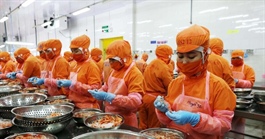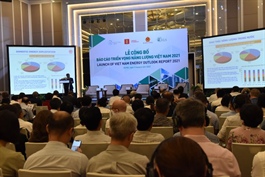Viet Nam to develop ‘independent and self-reliant economy’: PM
Viet Nam to develop ‘independent and self-reliant economy’: PM
Viet Nam will need to optimise its internal resources to build an ‘independent and self-reliant economy’ while maintaining international economic cooperation to speed up economic recovery post-pandemic, Prime Minister Pham Minh Chinh said at the fourth Viet Nam Economic Forum yesterday.
Addressing the forum’s plenary session, Chinh said the country was facing several challenges, including the risk of high inflation in addition to the significant impact of the COVID-19 pandemic.
“Some of the risks threatening the recovery process of the economy include the inflation pressure, especially from rising global energy and commodities prices.”
Intense political conflicts have also been the cause of the issue, he added.
The country must continue to maintain social orders, as well as political security and protect sovereignty, he noted.
According to the World Bank’s latest Global Economic Prospects report, global growth is expected to decelerate markedly from 5.5 per cent last year to 4.1 per cent this year, and 3.2 per cent in 2023 as pent-up demand dissipates and as fiscal and monetary support is unwound across the world.
The rising inflation is constraining monetary policy. Globally and in advanced economies, inflation is running at the highest rates since 2008, the report said.
In emerging markets and developing economies it has reached its highest rate since 2011, it added.
Other participants said the country should carefully regulate fiscal and monetary policies, undertake reforms to improve investment and human capital, reverse income, as well as deal with the challenges of climate change.
Furthermore, Viet Nam should consider continuously reducing excise tax and reschedule the increase in tariffs or fees to stabilise commodity prices.
Economist Nguyen Dinh Cung said Viet Nam needed to control supply chains of raw materials and energy for local production, and maintain global supply chains while trying to avoid supply chain disruption.
He noted that this was one of the challenges facing Vietnamese exporters since ocean freight charges and container prices continue to increase.
The Government also needs to continue to assist businesses in having access to loans and removing difficulties in logistics.
In addition, the reduction of the environmental protection tax rate will help minimise pressure on domestic gasoline prices caused by sharp increases in world oil prices, which will help cut production and transport costs for local businesses.
Capital markets
The PM also ordered capital markets, especially the bond market, to be developed in a “healthy, sustainable, secure and effective manner”.
All violations must be strictly punished while the rights and interests of investors and the enforcement ability of businesses will be protected, Chinh noted.
Speaking at a panel discussion about capital markets, Dr Vo Tri Thanh, former deputy director of the Central Institute for Economic Research, said while the Vietnamese bond market is new compared to global markets, it is among major capital mobilisation channels for enterprises.
However, the recent violations related to bond issuances have cast doubts among investors, creating uncertainty in the market, he added.
Nguyen Hoang Duong, deputy director of the Ministry of Finance’s Finance and Banking Department, said to improve the market requires three factors: state-oriented management, the transparency of information of credit rating agencies, and the compliance of market participants such as issuers and rating agencies.
Experts said it was important to develop a credit rating service market to help bondholders assess risks while making investment decisions. Currently, Viet Nam has only two enterprises in the field, which is too few compared to market demand.
Economic prospects
Speakers at a panel discussion on the development of the capital and real estate market at the fourth Viet Nam Economic Forum yesterday. VNS Photo Bo Xuan Hiep
Most forum participants expected that the country’s economic recovery and growth would see positive prospects in the remaining months of the year thanks to the reopening of tourism activities from March 15 and the recovery of air travel.
The high vaccination coverages have allowed Viet Nam to lift strict pandemic prevention measures, they added.
The country’s employment post-pandemic has also seen positive recovery trends, especially in HCM City and southern provinces which faced severe labour shortages during the fourth wave of the outbreak.
A recovering labour market, along with monetary and fiscal stimulus measures of the Government, is expected to help boost industrial growth at 9.5 per cent this year, contributing 3.6 percentage points to the country’s GDP growth.
However, the country needs to speed up the capital disbursement for public investment, they said.
It also needs to further institutional reforms, improve the business climate, creating fair competition for businesses, experts said.
These include tax breaks for productive and innovative investments, reducing barriers to doing business and investing in education and technical training of the workforce.
The forum also discussed the development of a stable labour supply chain post-pandemic, digital transformation and supply chain diversification.
The annual forum chaired by the Central Economic Commission has been organised since 2017.






















